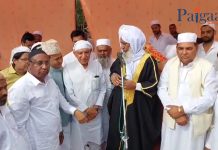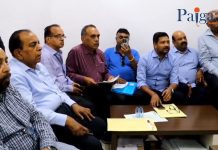SRINAGAR, AUGUST 30: The J&K State Climate Change Cell (SCCC), Department of Ecology, Environment & Remote Sensing, Government of Jammu & Kashmir in collaboration with the Department of Science & Technology, Government of India and Swiss Agency for Development and Cooperation organized a day-long workshop on “Springshed Management in context of Climate Change” under National Mission for Sustaining the Himalayan Ecosystem (NMSHE) at Banquet Hall, Srinagar here today.
Indian Himalayan Climate Adaptation Programme (IHCAP) of SDC and Advanced Center for Water Resources Development and Management (ACWADAM) also supported the initiative.
The workshop is the first one following the release of a report on Inventory and Revival of Springs in the Himalayas for water security by the NITI Aayog.
Representatives of various Departments of State Government, Universities, Civil Society Organizations from various parts of the country participated in the said workshop.
During the workshop, a discussion was held on how springs, an important source for the communities, are being impacted by climate change and what steps are required to revive the springs and thus adapt to climate change.
Speaking at the event O P Sharma, Director, JKDEERS stated that “there is a need for all stakeholders to come together in order to revive the springs”. He added that the policy and planning of spring-shed management should be undertaken after incorporating the scientific inputs from the experts in the field.
Dr. Himanshu Kulkarni, ACWADAM gave the keynote talk on the national and local importance of springs. Dr. Mustafa Ali Khan, team leader, IHCAP spoke at the inaugural of the workshop and provided the introduction to the workshop.
Deliberations were made on various topics related to climate change and sprig-shed management in the wake of depleting springs in the state by renowned experts in the field like Dr Himanshu Kulkarni (ACWADAM), Prof Shakil Romshoo, Prof Ghulam Jeelani, Prof Samiullah Bhat from University of Kashmir, Majid Farooq from State Climate Change Centre, Imran Sidiqqi and Mukesh Patil from ACWADAM Pune.

















































